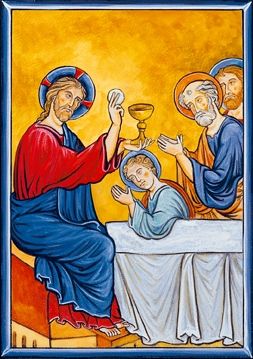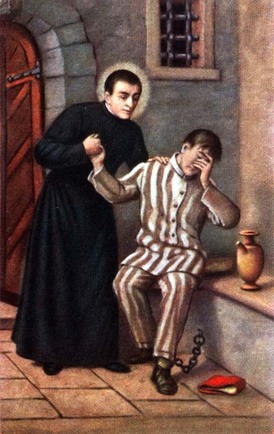Humor and Catholicism are not easily cohered by many people. For some reason, many people believe that to be a Catholic, a saint, a person “in-tune” with God means, by definition, to look unhappy, if not really be, unhappy. Yea, but no. Really, the contrary is true if you know God, His Son and sacred Scripture. To have a healthy, vibrant spiritual life is have joy. We hunger for intimate connections with God, others and self. We are made for love and joy. Yet, love and joy are mysteries in the Providence, and love and joy separates us from the animals, as does freedom. And to love is be full of joy, full of humor and delight.

Tonight, I had the pleasure of seeing an old and dear friend, Jesuit Father James Martin, speak at Yale University’s St Thomas More Catholic Chapel. Nearly hundred people were in attendance including members of the local and Yale communities. Father Martin is the Cultural editor of America Magazine, the only Catholic weekly journal of opinion. He’s the author of a plentitude of articles and several books (My Life with the Saints & The Jesuit Guide to (Almost) Everything, and he’s due to publish yet another book, Sarah’s Laugh: Joy Humor and Laughter in the Spiritual Life, in a few months.

Martin was invited by More House to deliver the More House Lecture, which since its establishment in 1962 has had a few distinguished Jesuits. The inaugural More House Lecturer was given by Father John Courtney Murray, SJ in 1962 on the topic of the Problem of God. Martin is now on a spry list of notable –and a few ignoble– scholars and cultural types. A terrific honor, indeed.
Father Martin’s point is that joy and laughter are under-rated in the spiritual life and are essential for a healthy physical and spiritual life. To be joyful is to be in-touch with God. Joy equals holiness (for those who pray).
While humor is culturally bound in time, place and location, there is evidence that laughter had some importance among the Old Testement characters, think of Abraham and Sarah, Isaiah and in the New Testament with Jesus, think of his interchange with Nathaniel. Saints had a particular bias for humor and joy and laughter, think of Saints Teresa of Avila, Philip Neri, Benedict, Blessed John XXIII and Teresa of Calcutta, and countless others.

Father Martin had ten points in praise of humor and its intimate connection with the spiritual life:
- humor evangelizes; humor shows others our faith in God, in the resurrection of Jesus from the dead; humor shows the victory of love over hatred;
- humor is a tool for humility; it aids in the quest of humility; humor is a great way to keep one grounded and away from the Deadly Sin of pride; as my mother says frequently, don’t take yourself that seriously;
- humor shocks the hearer to hear something new; humor gets the point of across
- humor speaks truth to power, especially when other forms of truth-telling seem to fail; do we need more pompous, puffed-up and powerful people with a distinct lack of humor leading us, in Church and in society?
- humor shows Christian courage: think of Saints Lawrence and Thomas More;
- humor deepens a relationship with God (if you have one); by analogy –Catholics love theological analogies: being in relationship with God is like being on the phone–someone talks and someone listens; a healthy relationship with God would mean that joy is very much a part of one’s relationship with God; as Father Martin pointed out from the Ignatian spirituality point of view, can I imagine that God might want to be playful with me? Can I delight in God’s desire for giving me the unexpected? Can I, like the Prophet Isaiah, allow God to delight in me and I delight in God?
- humor shows genuine hospitality, it shows the other that being welcome in a place is a virtue;
- humor is healing –it releases endorphins; one never laughs at sin or personal hurt but in its proper place humor gives us a break;
- humor opens our minds –it helps us to relax; humor helps get the message across, eases the burdens and allows us to imagine being personally with Jesus; joy is the surest sign of the Holy Spirit;
- humor is fun and fun is a foretaste of heaven.
Thanks be to God for the grace of laughing. John Paul II and Benedict XVI have also showed us the value and place of humor in life. As I have said before here: can I really take my humanity seriously? Can I be joy-filled? Can I allow God to show me the way to Him through humor?






